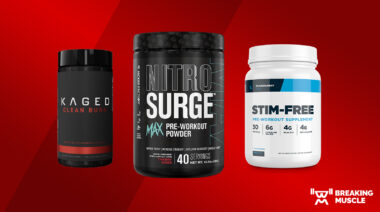Creatine monohydrate is probably the most successful athletic supplement in history. Science has shown incredible benefits through creatine supplementation ranging from greater strength to better brain function. And so far, no significant side effects have ever been reported. Recently, a new form of creatine called Kre-Alkalyn, or buffered creatine, entered the market promising to be safer and more effective than the old standby, creatine monohydrate. This irritated one of the largest creatine producers in the world, AlzChem, and they commissioned a study to determine if the new, buffered creatine lived up to its advertising claims. It did not.
The study took 36 resistance-trained men and subjected them to one of three dosage patterns for four weeks. The first group took regular creatine monohydrate (from AlzChem). They loaded with 20 grams/day for one week and then sustained dosage at 5 grams/day for the final 21 days. The second group took Kre-Alkalyn buffered creatine at the manufacturer’s recommended dosage of 1.5 grams/day for all 28 days. And just for the hell of it, the study also gave another group Kre-Alkalyn buffered creatine, but at the much higher than recommended dosage equivalent to the creatine monohydrate group: loading at 20 grams/day and maintenance at 5 grams per day. Very cool idea.1
The result: not very much difference at all. Strength, body composition, blood chemistry – none of the three groups showed a significant difference over the others. All groups showed the benefits associated with creatine supplementation, but no group showed them any better than another.
Producers of Kre-Alkalyn claim buffered creatine offers better safety through reduced conversion to the toxin creatinine. The study found no evidence to support this. To be fair, the group that took low doses of Kre-Alkalyn did have lower blood levels of creatinine, but the difference wasn’t significant enough to draw a firm conclusion.
Now for the caveats. This study is a poster child for why you should be skeptical of even scientifically backed claims. The study was paid for by AlzChem, one of the largest producers of creatine monohydrate in the world, and the study just happened to prove the new product from AlzChem’s competitor isn’t all it’s cracked up to be. Convenient, huh?
Still, I am comfortable trusting the results of this study. I don’t like the conflict of interest in who funded it, but the methods were very thorough, and the claims are not extraordinary at all. The study essentially claims that the status quo is still the status quo. Creatine is still creatine and it’s still a great supplement.
Photo courtesy of Shutterstock.






